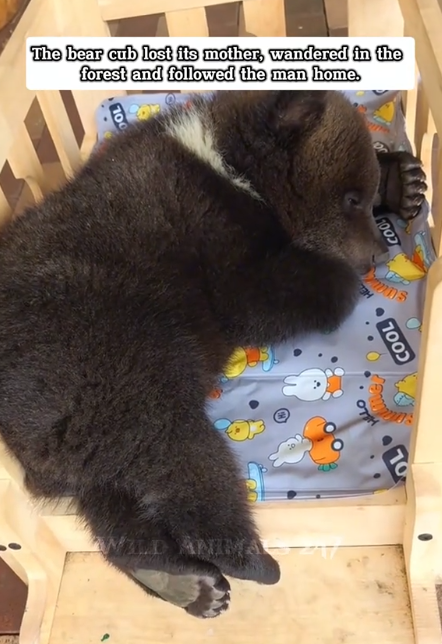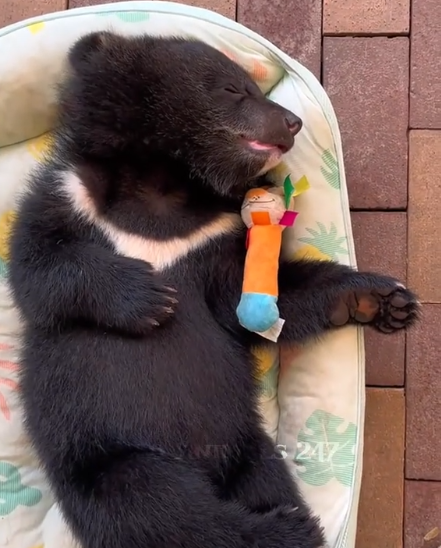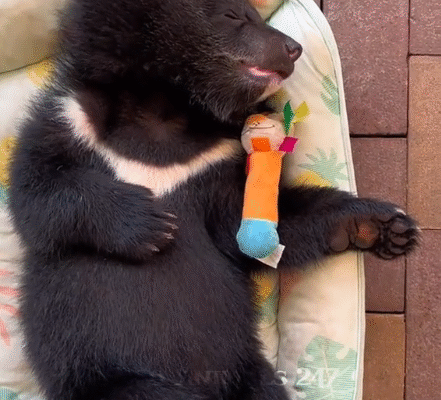
In the heart of a vast forest, where the trees stretched toward the sky and the rivers sang lullabies to the earth, lived a baby bear named Miko. Miko was just a few months old, a fluffy bundle of curiosity and energy. He followed his mother everywhere—learning how to catch fish, how to climb trees, and how to recognize the scent of danger. His mother, a strong and gentle bear named Nala, always stayed close, guiding him with patience and love.
But one cloudy morning, everything changed.
The forest was unusually silent. Birds didn’t sing, and the wind barely rustled the leaves. Miko and Nala had gone to the riverbank to catch fish for breakfast. As Nala stood still in the shallow water, her eyes locked onto a wriggling trout. Miko was just behind her, watching eagerly. Suddenly, there was a sharp crack—like thunder—and birds exploded from the trees. A group of loud humans emerged through the brush with strange machines slung over their shoulders. Nala let out a deep growl and nudged Miko hard with her nose, sending him tumbling into the bushes.
“Hide, Miko!” she growled.
Before Miko could turn back to look, he was surrounded by thick brush. He crouched low, his heart pounding. When he finally dared to peek through the leaves, his mother was gone.
The humans had disappeared too, leaving only the smell of oil and fear behind. The riverbank was empty. Miko waited for hours, calling softly for Nala. But she didn’t return.
Days passed.
Miko wandered through the forest, calling for his mother. At first, he stayed near the river, thinking she would come back. But when his stomach began to ache with hunger, he knew he had to move. He remembered some of the things she had taught him—how to find berries, how to sniff out grubs—but without her by his side, everything felt harder, scarier.
He climbed a tree and looked out over the forest. All around him were trees, stretching endlessly. Somewhere in that vast space, maybe his mother was still looking for him too. That thought kept him going.
Miko’s journey became one of survival. He avoided the loud paths where humans sometimes appeared. He learned to listen closely for the sounds of danger. One evening, while drinking from a small stream, he heard twigs snapping. His fur bristled, and he darted into a bush. A large fox passed by, sniffing the air. Miko stayed still, barely breathing, until the fox disappeared into the trees.
Another time, he stumbled upon a pack of wolves. They didn’t see him, but their scent filled the air like a warning. Miko climbed the nearest tree and waited until the moon was high before climbing down again.
Each night, he curled into a ball, trying to remember the feel of his mother’s fur and the soft rumble of her voice.

One morning, while searching for food, Miko came across a raccoon named Tilly. She was perched on a fallen log, munching on mushrooms.
“You look lost,” she said, tilting her head.
“I lost my mother,” Miko whispered.
Tilly’s eyes softened. “That’s hard, little bear. But you’re still here. That means you’re strong.”
Miko didn’t feel strong, but Tilly decided to help him anyway. She showed him where to find sweet berries and where the honeybees built their hives. She even taught him how to open a hollow log to find beetles inside. They became unexpected friends, and for the first time in weeks, Miko felt less alone.
Tilly couldn’t replace Nala, but she offered something important—kindness.
As weeks turned into months, Miko grew. His legs became stronger, his paws wider. He could climb trees faster and smell food from far away. The forest, once frightening, began to feel like home again. But the ache of missing his mother never left completely.
One day, while following the scent of fresh fish, Miko came to a wide riverbank. It looked familiar. The trees, the rocks, even the bend in the water. His heart skipped. This was where he had last seen her.
He stepped carefully toward the water and sniffed the air. The scent was faint, but something about it pulled at his memory. Could she still be nearby?
Suddenly, there was movement from the trees. Miko froze.
A large bear emerged, her fur darker than his, with kind, tired eyes. For a moment, neither moved. Then Miko took a cautious step forward.
“Nala?” he whispered, unsure if it could be real.
The bear sniffed the air, her eyes wide with recognition. She let out a deep, shaky breath.
“Miko?”
He ran to her, and they embraced in the bear way—nuzzling, grunting, tears hidden in fur.
“I thought I’d lost you,” Nala murmured. “I searched everywhere.”
“I was scared,” Miko said. “But I remembered what you taught me.”
Nala looked at him with pride. “You’ve grown so much, little one.”
They sat by the river, watching the water dance in the sunlight. Miko told her about the wolves, the fox, and his friend Tilly. Nala listened to every word, her heart aching with both sorrow and pride.
That night, they curled up under the stars. Miko, safe in the warmth of his mother’s side, listened to the familiar rhythm of her breathing. The forest around them was alive with sounds—owls calling, crickets chirping, the rustle of wind through leaves.
Miko knew he was lucky. Not every lost baby bear found their way back. But he also knew that even if they hadn’t been reunited, he would have survived—because of what she had taught him, and because of the kindness of others.
The forest could be wild, unpredictable, and at times cruel. But it was also full of moments of grace, of second chances, of reunions that stitched broken hearts back together.
And as the moon rose high, casting silver light on the trees, Miko felt whole again.
The End.



